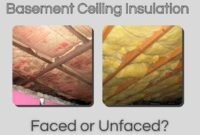Insulating our homes, particularly areas like the basement ceiling, is vital for energy efficiency and combating climate change. In homes with utilities such as water heaters and water pipes in the basement, options like foam board insulation can be highly effective.
Insulating the basement ceiling helps maintain warm air upstairs during winter and keeps cold air in basements during summer, enhancing overall comfort.
Properly insulating the basement ceiling is crucial in maintaining a comfortable indoor temperature. It effectively reduces energy consumption by preventing warm air from escaping during winter and cold air from seeping in during summer. This insulation, especially important in unfinished basements, can significantly lower utility costs.
Should You Insulate Basement Ceiling?
Whether or not to insulate your basement ceiling hinges on various factors, including your home’s specific conditions, the basement’s purpose, and your locality’s basement ceiling insulation code.
In cases where the basement is used primarily for storage or utilities rather than as a living space, insulation may be less critical. However, insulating the basement and foundation walls can be more beneficial in such scenarios.
This approach helps prevent the ground’s cold temperatures from penetrating your home, particularly in regions with frigid climates.

Insulation can enhance energy efficiency by reducing heat exchange between the basement and the floor above. However, insulating your basement ceiling could also have drawbacks.
For instance, if not correctly installed, it may trap moisture, leading to potential mold growth. Additionally, it may make accessing plumbing and electrical systems more complex. Hence, careful consideration must be given to your short-term and long-term needs.
While insulating the basement ceiling is beneficial, complementing it with wall insulation is crucial for comprehensive energy efficiency. Materials, like extruded polystyrene or wall spray foam insulation, can effectively work alongside ceiling insulation.
This combination ensures a well-insulated basement that maintains a consistent temperature, protecting against warm and cold air extremes.
Benefits of Insulating Basement Ceiling
Insulating the basement ceiling helps retain heat and prevents cool air from seeping into living spaces above. This is particularly beneficial in homes where the basement is used for storage or utilities, as it helps maintain a comfortable indoor environment.
The Cheapest Way to Insulate Basement Ceiling
The most cost-effective option for basement ceiling insulation is generally blanket (batt and roll) insulation. This versatile material is available in various sizes, allowing for easy fitting between the studs and joists of your ceiling.
Moreover, blanket insulation is often the choice of DIY enthusiasts as it doesn’t require professional equipment or specialized skills for installation.
Alternatively, loose-fill insulation, such as cellulose or fiberglass, can be economical for uneven or hard-to-reach spaces. This type of insulation can be blown or sprayed into gaps and cavities, conforming to the shape of your ceiling and providing complete coverage.
Basement Ceiling Insulation Tips
Basement ceiling insulation can be a daunting task. Follow these tips to guide you through the process:
● Adhere to Your Local Codes
Always follow your local basement ceiling insulation code. It sets the required standards for safety and efficiency, ensuring that your project meets the legal requirements.
● Use Insulation Supports
Batt insulation can sag over time, decreasing effectiveness. Use insulation supports to hold it in place securely. These wire rods are easy to install and provide the necessary support to your insulation.
Read also: 5 Steps on How to Cut Batt Insulation
● Ensure Even Distribution
The distribution must be uniform when using loose-fill insulation to provide optimal insulation value. Unevenly distributed insulation may lead to heat loss in certain areas.
● Consider the R-value
The R-value measures thermal resistance. Higher R-values mean better insulating power. Insulation materials with high R-values can help improve your home’s energy efficiency.
● Ensure Sufficient Ventilation
Proper ventilation is crucial when insulating your basement ceiling. Without it, moisture can become trapped, leading to mold growth, damaging your home, and negatively impacting your health.
When installing insulation in the basement ceiling, such as foam boards, ensure they fit snugly between the joists. This snug fit is essential to prevent gaps that can lead to energy loss. Additionally, consider the accessibility of utilities like water heaters when planning the insulation layout.
What is Proper Insulation for the Basement Ceiling?
Choosing the proper insulation material is crucial to the success of your project. Take a look at these various options to consider:
● Fiberglass
Affordable and easy to install, fiberglass is a common choice for basement ceiling insulation. However, it must stay dry to prevent mold growth and maintain its insulating properties.
● Mineral Wool
While more expensive, mineral wool insulation provides excellent fire resistance and soundproofing properties. Its dense fibers absorb sound waves, making it an ideal choice for basements used as living spaces.
● Cellulose
Cellulose insulation, made from recycled paper, is an eco-friendly option. It’s also fire-resistant, as it’s often treated with fire-retardant chemicals.
● Spray Foam
Though pricier, spray foam offers a high R-value and can fill small cavities, ensuring effective insulation. Its ability to expand and contract with temperature changes helps prevent air leaks.
Read also: Spray Foam Insulation Roof Problems
Should you insulate the basement ceiling? The answer often lies in the specific needs of your home. Basement ceiling insulation could be the key to a more energy-efficient and comfortable living space, whether through spray foam insulation, fiberglass, or foam board insulation.
However, it’s essential to consult with insulation professionals and adhere to local building codes when making such decisions, especially to ensure proper installation around water pipes and other utilities.


